Comedian of the Year Jenny Slate on Her Biggest 2019 Lessons, Misogyny in Standup, and Future Goals
The post Comedian of the Year Jenny Slate on Her Biggest 2019 Lessons, Misogyny in Standup, and Future Goals appeared first on Consequence of Sound.
Listen via Apple Podcasts | Spotify | Google Play | Radio Public | Stitcher | RSS
Halfway through our call, a handyman stops by Jenny Slate’s home to pick up an armful of signed copies of her new book, Little Weirds, his preferred repayment for patching some drywall over a burst pipe. After momentarily losing reception, she relocates to the room where her fiance sits, apologizing for potentially bothering him. Despite these interruptions, these life-happenings—or perhaps in part through them—Slate’s focus never strays from a heartfelt, dynamic exploration of what it means to add something meaningful to the world, to respect and connect with people.
That vibrant life has come across in a variety of comedic art forms. Slate has starred in indie films and cult TV shows. She’s voiced a beloved stop-motion shell and multiple animated animals. She’s now authored or co-authored books, and recently released her first comedy special for Netflix, Stage Fright. Across that wide swathe, Slate stands out as a singular voice of joy.
Speaking with Slate is like living momentarily inside of a Joanna Newsom song filtered through scenes from Amelie. (Stops on her book tour even included a harpist, to sweetly soundtrack her reading.) Her keen eye takes in the minute specifics of all of life’s beauty and pain, and then offers an operatic reply full of wide-eyed wonder and awe. She takes serious topics seriously, but not without a kind-hearted welcome. She dissects a concept right down to its matter, and then returns to refine it some more. Slate emanates ease, making it seem as if you’re talking to a very close friend. She sees you because she sees herself.
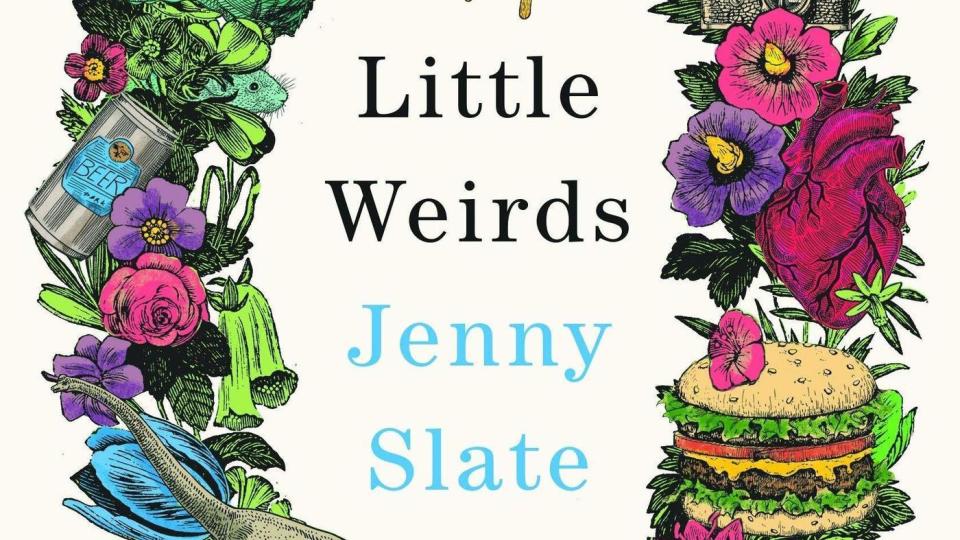
Little Weirds by Jenny Slate
In the first essay of Little Weirds, she writes that she imagines people see her as “a homemade Parisian Croissant.” She’s not only constructing a buttery image there; it perfectly fits her reality. To bolster that playful indulgence, her book’s cover is wreathed in other surreal iconography, including a beer can, ornate flowers, a burger, a tiny dinosaur, and a verdant green bra. Going that sweet and sentimental has its rewards, as evident in the overwhelmingly positive response to her year.
Recently during the Chicago stop on her book tour, the audience was prompted to ask questions, but the ideals they wondered aloud felt more like ecumenical love letters and prompts to pour into her wisdom, to make tangible the menacing maniacal doom that love, dating, self-worth, and loss can bring to you. Treating my seat on the top balcony like some sort of diving board, my body instinctively leaned forward with every answer. It’s all about finding your little weirds, where you belong, and how you connect to it all.
Meanwhile, Stage Fright’s intimate embrace begins when Slate appears onstage, waving and offering emphatic star jumps, mouthing along and dancing to Robyn’s “Missing U”—a miniature performance that immediately defies expectations of the art of the special itself. Instead of indulging in pomp and swagger, she makes you feel like you’re not only in the room but in her mind too. She exudes an air of excitement and joy—but perhaps some nerve as well. She’s seriously committed to her connection to the audience and to her material, yet also in the moment, defying the misogynist perfectionism of the form. It’s docu-standup, reveling in the humor of real life. And in a world so obsessed with sharing a perfected image, an ideal, Slate finds the humor, delight, and overwhelming power in every small, real moment—of life as a buttery croissant.
Read a number of highlights from our conversation with Slate below, and hear the full interview above in a special year-end episode of This Must Be the Gig.
On Year-End Perspective and the Difference Between Feeling and Acting
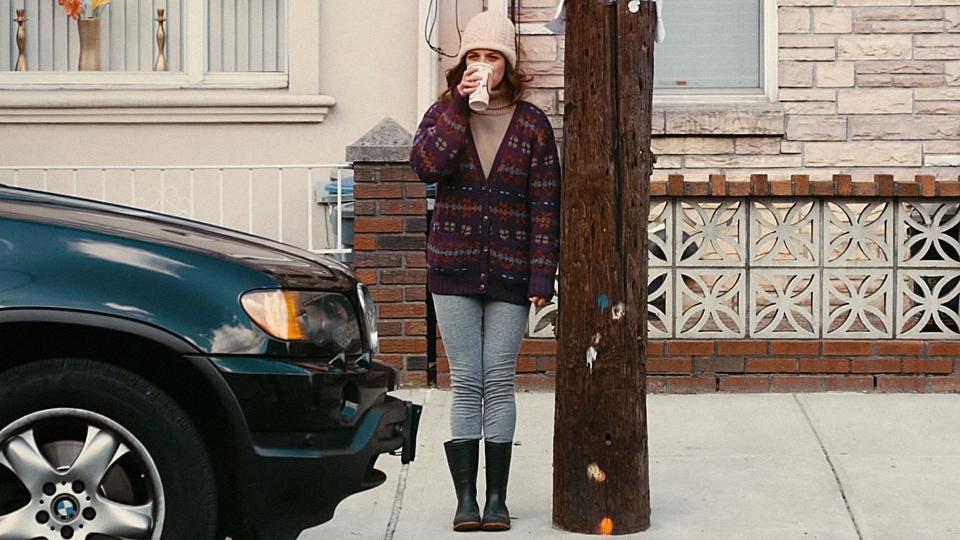
At this point, Christmas culture doesn’t necessarily mean that it’s religious, but it’s there: all these images of coziness that at least for now are paired with like, “Get to Target at 12 AM for the midnight Black Friday sale where we’re all going to buy actual garbage that will break and is made unfairly and cruelly in another country,” or whatever. And it just feels like shit to me. The culture of Christmas is this strange duality of super classic sitting around drinking eggnog and doing stuff like that—and it’s a bunch of people who don’t look like me because, by the way, I’m not Christian and don’t celebrate Christmas. It’s these people that are wasting their money because they’re being tricked by Target. And it just feels really bad.
There’s all that in the collective unconscious, and I do think it weighs on everyone, but there’s also a lot of cool things about it too. I just try to make it new every day, because even the good things that have happened, and I would say that this has been a particularly positive year for me and it felt pretty bountiful in terms of my work, I’d had this cycle before where I’ve been like, “Yes, I just totally threw down what I meant to throw down and I’m really, really proud of it.” And then I go into a dormant cycle, and that dormant cycle is really, really important for me creatively.
But in a culture and in an industry where you’ve got to constantly be fracking yourself for your own power, that dormant cycle can seem like failure. It can seem like you’re losing momentum, and it’s actually just not true. And so there’s really nothing to take with you except for your clarity of mind and the continual practice of trying to find some comfort in a daily human condition. And that’s where I’m at right now.
And for me, yesterday, I felt pissy. I had a doctor’s appointment that was an hour away from where I live, where some lady was just going to stare into my vagina. And I don’t really need that at 9:00 AM, but that’s what has to happen to me at this point because I am a human being. It doesn’t feel good. But for whatever reason, I ended up being kind of pissy all day.
But what I’m most proud of, my fiance and I were taking a walk after sundown last night, and we both were kind of down. We’re both catching a cold, and we’re sort of pissy, and we said at the same time, “Wow, we really made it through this day without catching on to that bad thing that wanted to take us.” We didn’t do anything pissy to each other. We survived that bitter day. And that is really cool. There is definitely a time when I just felt so entitled to having all my feelings, which is fine and right, that I couldn’t separate having them from acting on them—which is a fucking giant difference.
On Her Biggest Lessons of 2019
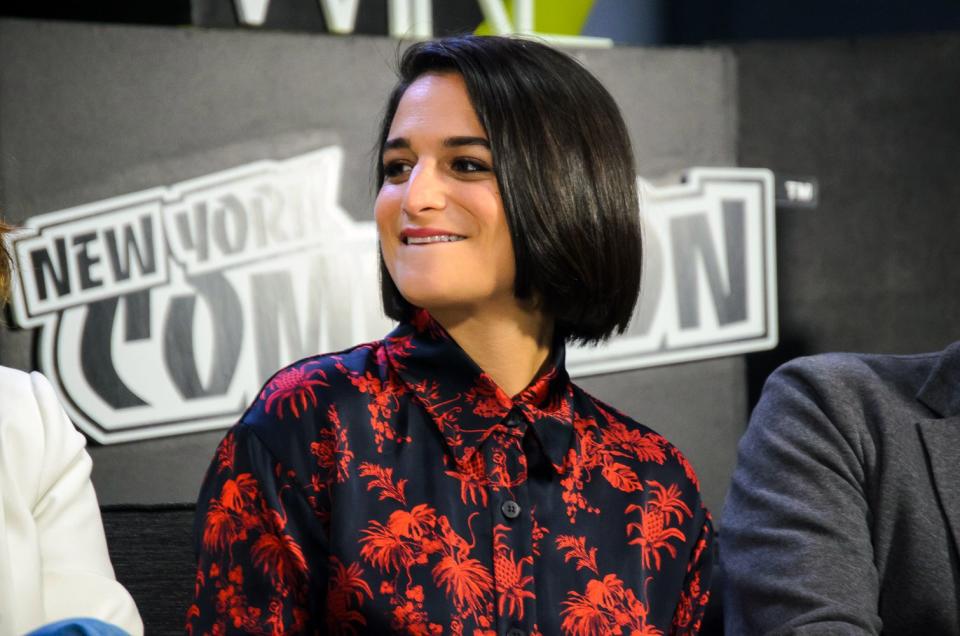
Jenny Slate at Comic Con 2018, photo by Ben Kaye
There’s been a lot of standup that I’ve done over the years and I can’t remember it, I don’t know what it’s about—it’s gone away. So I won’t say that the special is the culmination of all of my standup, because it just isn’t. I really think that I learned the very obvious but important lesson that I do my work first and foremost as a gift to myself that I make for myself. And then I like it so much that I give it away. That giving away feels good. It gains a wonderful mass. You start to feel its weight, but you can’t keep it for yourself. It becomes a burden if you just keep it in.
You need to give it away, but you can’t give it away if you don’t make it nice. You can’t just dump your experience on people because you don’t want to bum them out. In order to give away what I need to give away—to feel authentic in this world, to feel like I pleased myself and that I care about my experience and that I can control how much I suffer or feel pleasure—I developed a message for myself: sorrow is not the same as pessimism. I don’t want my art to be pessimistic, and I really want it to be hopeful. I want to give hope to our world right now and live in a state of hope, even if that feels foolhardy. I don’t think it is. A lot of what I feel has been sorrowful, but there’s a use for it. There’s an energy to it that is very interesting if you’re willing to get in there and look at it.
I also learned how to work privately. I didn’t tell anyone I was making my special except for the people I was making it with. And I wrote my book completely privately. I had an editor, but at one point I just told her, “I need to not be showing you anything for the next five months at least.” I just can’t create if I feel like other people are judging my process because there’s a lot of it that just looks totally crazy. I have to be able to be gentle on it in order to take it to the end. And I’ve got to say, for the very first time I feel like I learned how to be a good partner. I’m learning that still, but I stepped out of a lot of old behaviors that I’ve been doing for quite awhile.
On the Inanity of Legacy
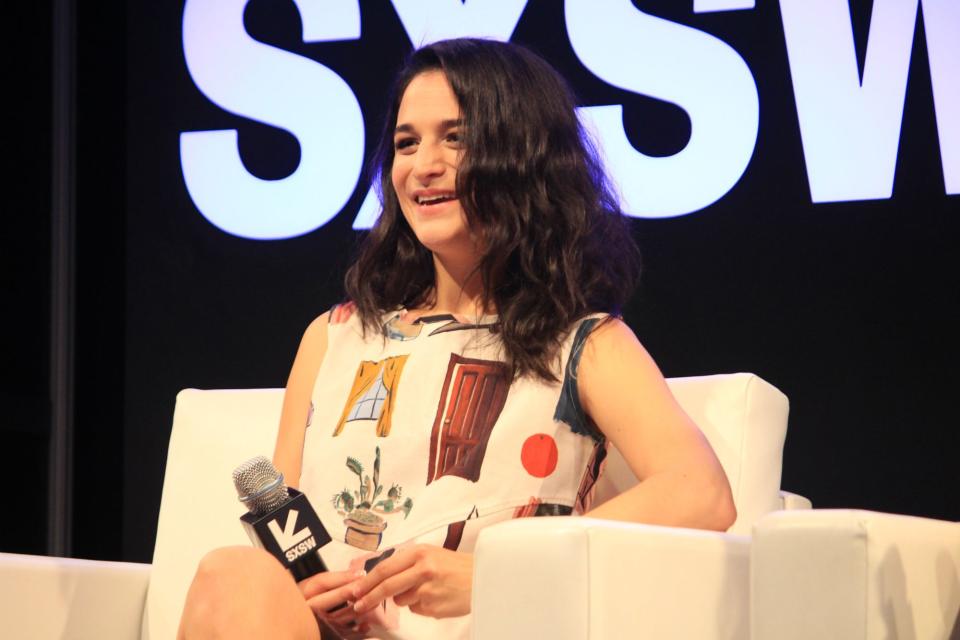
Jenny Slate at SXSW 2017, photo by Heather Kaplan
Oh, I don’t give a shit about a legacy. Legacy feels, to me, like a misogynist concern. I just don’t relate to that and I don’t care. One day I will die and I won’t know that I’m dead because I’ll be dead and that will be fine. I don’t care. But I definitely care about whether or not I’m helping out or causing damage. But that’s just built in; that’s not why I do my work. I think my work will always try to be additional to our world, to try to add something. But I think I do my work out of a need for connection, which I’ve become comfortable with. That’s a cycle: I need to connect to myself. When I connect to myself, I become a gardener in my own sphere and suddenly something blooms. And I give that bloom away, and then I watch other people react. I take those reactions and it makes me see myself in a new way again, and then I make something new. I just need to be out there.
On Fighting the Misogyny of Standup

Jenny Slate’s Stage Fright (Netflix)
The reason why I didn’t make a special for so long was because I was like, “I don’t like how they do it. And I don’t think I’m allowed to do it in another way. This is how they say you’re supposed to do it.” I wrote to Netflix being like, “I want to actually do this thing. And I don’t want it to be a feminist battle cry, but I would like it to be sort of a feminist symphony.” Standup has, what I think are, rather misogynist rhythms. And when I say that, I mean misogyny really wants there to be one way. It wants that way to be replicated again and again. There’s one main guy, there’s one main way to be masculine, and you replicate that. And like Rebecca Solnit says, make sure that you are not penetrable, because to be penetrated is to be degraded in that image.
And so to repeat and repeat and repeat until you’re perfect feels misogynist to me. And [there’s a rule] to not reveal much about yourself, to not reveal anything that people could use against you. And so I decided I just wanted to show everything about me and say like, “Hey man, if you have seen all of this and your choice is to like try to rail me, that’s not on me. That’s crazy. I’m giving you access to everything. And I’m going to show that I can do this work, but that I also have this heart and I have these limits and I have these fears and they’re a part of why I’m here. And it would be a lie to say that I’m on stage because I’m a hundred percent confident.” I think that’s what keeps a lot of people from not doing standup.
I decided to do this special after I saw Hannah Gadsby’s special, Nanette, because I was like, “Well, she just tore this whole shit down and now all these guys are having some sort of irrelevant argument about whether or not this is standup.” And of course this is fucking standup. You’re just scared because you can’t do it and you haven’t done it. And because she’s using images and stories that are traditionally kind of unspeakable or just meant for your psychiatrist or just meant for your most intimate friends or in the worst case meant for nobody but your own internal suffering, and she’s using them and we’re all here with her.
And while I don’t have stories like that, and I’m thankful that I haven’t had that experience that she has had, I have an instinct to be out there as myself and to not have to do it in the same way that some dude from the ’70s did it. It’s the study of how do you be powerful without being so dominant that you are the only thing occurring. How do you become the generator of a moment, but let that be in an infinity loop with the audience?
On Her Vision of 2020
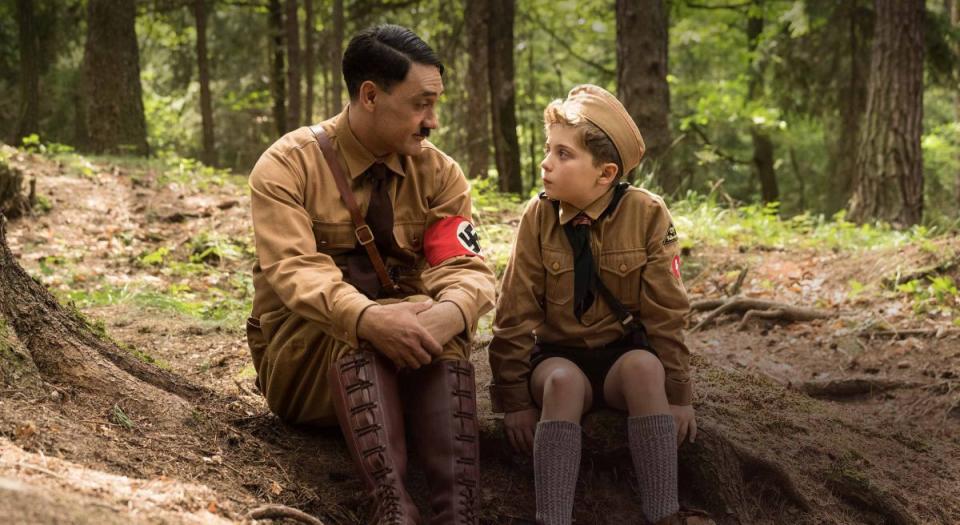
Jojo Rabbit (Fox Searchlight Pictures)
I want to see more movies like Jojo Rabbit and more movies like A Beautiful Day in the Neighborhood. I want to see more work that assumes that its audience is benevolent and smart, and that takes risks in that way. I want to see work like that is opposite from … when I watched Joker. I was so upset by how dangerous the messaging in that film was and how careless I thought it was. That doesn’t mean the performances weren’t good, because the performances are great, but the movie is irresponsible and it just made me feel so sad.
And then I saw Jojo Rabbit, which is a film that legitimately begins with archival Nazi footage, where people are just caught up in the frenzy of being Nazis and they’re pumped about it. And that film uses footage that could be dangerous and that could in the wrong hands incite violence and hatred. And instead in the most complex way, it says, “Take this in as part of a greater whole where you as a tentative audience member know what is right and what is wrong.”
To be part of what is good means that you have to look at the bad and that you have to handle it. You have to hold it in your hands and sort it. And that film ends with a beautiful Rilke quote about letting everything happen to you. And I just hope that there is more art like that that is complex and takes risks and says, “At the end of the day, we are all good and smart enough to make decisions for the community that will have a lasting benefit.” That’s what I want. And for my own self, I just hope that I can take in a lot of information and be a very aggressive learner. That’s my goal for this year.
Comedian of the Year Jenny Slate on Her Biggest 2019 Lessons, Misogyny in Standup, and Future Goals
liorphillips
Popular Posts
R.I.P. Jack Sheldon, Schoolhouse Rock! singer and jazz musician dead at 88
There is nothing rock about Billboard's Top Charting Rock Songs of the Decade
Snoop Dogg smokes blunt outside White House: "Fuck the president"
Captain America actress Mollie Fitzgerald charged with murder
Patti Smith wrote Greta Thunberg a poem for her 17th birthday

